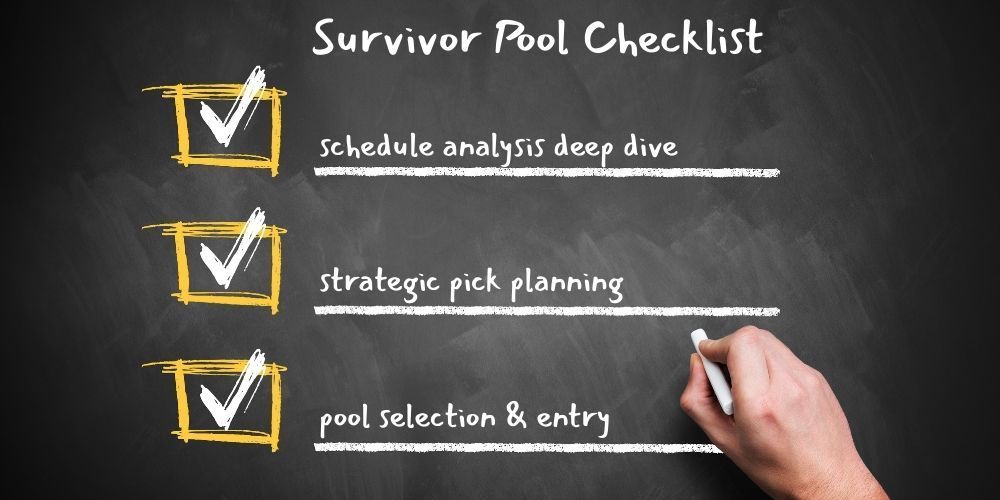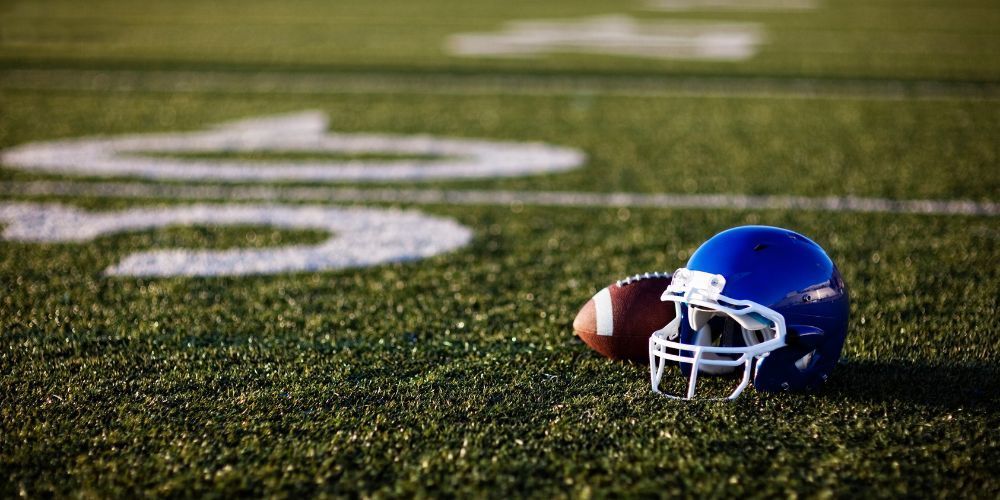How to Spot Early-Season Upsets in Survivor Pools
William Flaiz • June 26, 2025
The first few weeks of the NFL season are a minefield for survivor pool players. Every year, seemingly "safe" picks get knocked out by surprise upsets that nobody saw coming. Remember when the Jaguars stunned the Colts in Week 1 of 2022? Or when the Giants shocked the Titans that same opening weekend?
Early-season upsets happen for predictable reasons. Teams are still figuring out their identity, new players are adjusting to systems, and coaches are experimenting with lineups. The good news? You can learn to spot the warning signs before they wreck your survivor pool.

Why Early-Season Upsets Are So Common
The NFL's parity makes any given Sunday unpredictable, but the first month of the season is especially chaotic.
Here's why:
Roster Turnover Creates Chemistry Issues
Every team loses and gains players during the offseason. Even minor changes can disrupt timing and communication. A new left tackle might struggle with pass protection. A rookie safety could blow coverage assignments. These growing pains are most visible in September.
Preseason Performance Doesn't Translate
Preseason games use vanilla schemes and feature backups playing against other backups. The team that looked unstoppable in August might struggle when facing first-string defenses running their actual playbook.
Motivation Mismatches
Some teams start slow because they're overconfident or dealing with distractions. Meanwhile, teams with low expectations often play loose and hungry. The underdog with nothing to lose can be dangerous against a favorite that's already thinking about their next opponent.
Weather and Travel Factors
Early September can still be brutally hot in some cities, affecting conditioning. Teams traveling across time zones might struggle with jet lag. These physical factors impact performance more than you'd expect.
Red Flags That Signal Potential Upsets
Coaching Changes and New Systems
When a team hires a new head coach or coordinator, expect growing pains. New systems take time to implement, especially on offense. Look for teams with:
- First-year head coaches (historically struggle in Week 1)
- New offensive coordinators with different schemes
- Teams switching from 3-4 to 4-3 defense (or vice versa)
Example: In 2023, the Panthers hired Frank Reich and struggled early with a new offensive system, leading to several upset losses in September.
Key Player Injuries or Suspensions
Star players missing games creates opportunity for upsets. But don't just look at the obvious names. Sometimes the backup left tackle or starting safety makes the difference.
Pay attention to:
- Quarterbacks dealing with minor injuries
- Offensive line changes (especially at center or left tackle)
- Missing defensive coordinators or signal-callers
Revenge Game Narratives
Players and coaches have long memories. When a team faces their former coach or a player returns to face his old team, emotions run high. These games often play out differently than expected.
Example: When Tom Brady returned to New England in 2021, the emotional storyline helped fuel an upset atmosphere.
Travel and Schedule Disadvantages
Some early-season scheduling quirks create upset opportunities:
- West Coast teams traveling East for 1 PM games
- Teams coming off Monday Night Football playing on short rest
- International games in London (jet lag affects everyone differently)
How to Analyze Week 1 Matchups
Week 1 deserves special attention because it's the most unpredictable week of the season. Here's your checklist:
Check the Preseason Injury Report
Teams hide injuries during preseason, but they become obvious in Week 1. A star player listed as "questionable" might be more hurt than expected.
Look at Offensive Line Continuity
Teams with multiple new starters on the offensive line often struggle early. Pass protection takes time to develop, and running games suffer without proper blocking schemes.
Identify Teams with New Quarterbacks
Whether it's a rookie starter or a veteran on a new team, quarterback changes create uncertainty. Even talented QBs need time to build chemistry with receivers.
Review Recent History
Some teams are just bad in September. The Steelers historically start slow. Certain coaches consistently struggle in season openers. Use this historical data to your advantage.
Practical Examples from Recent Seasons
- 2023 Week 1: Patriots Over Bills The Bills were heavy favorites at home, but the Patriots' defense generated five turnovers. New England had better continuity on defense while Buffalo was integrating new offensive pieces.
- 2022 Week 1: Giants Over Titans The Titans were expected playoff contenders, but the Giants played with house money under a new coaching staff. Tennessee's offensive line struggled in pass protection, leading to two sacks and three turnovers.
- 2021 Week 1: Cardinals Over Titans Arizona's new additions (J.J. Watt, A.J. Green) gelled quickly while Tennessee dealt with holdout drama and contract disputes affecting team chemistry.
Your Early-Season Survivor Strategy
Avoid These Common Traps
Don't Chase Last Year's Success
Teams that made deep playoff runs often start slow the next season. They face tougher schedules and get everyone's best shot.
Don't Trust Preseason Darlings
Media hype doesn't win games. Teams that dominated preseason headlines often disappoint when real bullets start flying.
Don't Overlook Coaching Experience
Veteran coaches know how to prepare teams for Week 1. First-year coaches often struggle with game management and preparation.
Smart Early-Season Picks
Target Home Favorites with Continuity
Teams returning most of their starters, playing at home, against opponents dealing with change make good early picks.
Look for Motivation Advantages
Teams with something to prove (new coaches, players in contract years, clubs coming off disappointing seasons) often start fast.
Consider Defensive-Minded Teams
Defense travels better than offense early in the season. Teams with strong defensive coordinators and returning defensive cores are often safer picks.
Week-by-Week Breakdown
Week 1: Maximum Caution
Avoid heavy favorites unless they have significant advantages in coaching, continuity, and motivation. Consider taking smaller favorites with less risk.
Week 2: Adjustment Week
Teams start showing their true identity. Look for overreactions to Week 1 results that create value opportunities.
Week 3: Pattern Recognition
By now, you can identify which teams are legitimate and which were mirage. Use this information to avoid fool's gold teams.
Week 4: Settling In
Most teams have found their rhythm by now. Early-season chaos starts to fade, making favorites more reliable.
Tools and Resources
Check Injury Reports Religiously
Don't just look at the official report. Follow beat reporters on social media for insider information about player availability.
Monitor Line Movement
If a betting line moves significantly toward the underdog, investigate why. Sharp bettors often know something the public doesn't.
Track Coaching Tendencies
Some coaches consistently start slow or struggle with specific types of opponents. Keep notes on these patterns.
Use Weather as a Factor
Extreme heat, rain, or wind can level the playing field between talented and less talented teams.
Common Mistakes to Avoid
Getting Cute Too Early
Don't try to be clever in Week 1. Save your contrarian picks for later in the season when you have more information.
Ignoring Preseason Injuries
Players who missed significant preseason time due to injury often start slowly, even if they're cleared to play.
Overvaluing Offensive Additions
New offensive players need time to learn systems and build chemistry. Defensive additions typically contribute faster.
Following Public Betting Trends
The public usually bets on popular teams and overs. In survivor pools, popular picks often mean shared risk without reward.
Building Your Early-Season Game Plan
Create a ranking system for the first month of games. Consider these factors:
- Coaching Continuity (30% weight)
- Roster Stability (25% weight)
- Home Field Advantage (20% weight)
- Motivation Factors (15% weight)
- Matchup Advantages (10% weight)
Use this framework to identify safe picks and potential trap games. The goal isn't to predict every upset, but to avoid the most dangerous situations.
Remember: early-season survivor pool success isn't about finding the perfect pick. It's about avoiding the obvious disasters that knock out 30% of pools before October arrives.
What's the biggest mistake survivor pool players make in early weeks?
The biggest mistake is chasing last year's playoff teams without considering how much they've changed. Teams that made deep playoff runs often deal with roster turnover, salary cap constraints, and tougher schedules the following season. They also become everyone's "Super Bowl" – opponents play their absolute best against them. Instead of blindly picking last year's champions, focus on teams with coaching continuity, roster stability, and favorable early-season matchups. The 2022 Rams are a perfect example – they won the Super Bowl in February but started 2-3 the next season due to injuries and opponents giving them their best shot every week.
How much should I worry about preseason performance when making Week 1 picks?
Preseason performance should be largely ignored for survivor pool purposes, but preseason participation matters a lot. Teams that rest their starters extensively often start slowly because they lack game rhythm and timing. Conversely, teams whose starters played significant preseason minutes usually have better chemistry early on. Pay more attention to who played rather than how they played. Also watch for players who missed preseason time due to holdouts or minor injuries – they often need a few weeks to get up to speed even if they're officially healthy for Week 1.
Are there certain types of teams I should always avoid in September?
Yes, avoid teams with first-year head coaches in Week 1 – they historically struggle with game preparation and in-game adjustments. Also be cautious with teams that had major coordinator changes, especially on offense, as new systems take time to implement. West Coast teams playing early East Coast games are also risky due to body clock issues. Finally, avoid teams coming off disappointing seasons who fired their coach mid-year the previous season, as they often lack identity and confidence early on. These situations create perfect storm scenarios for upsets that can end your survivor pool before it really begins.











